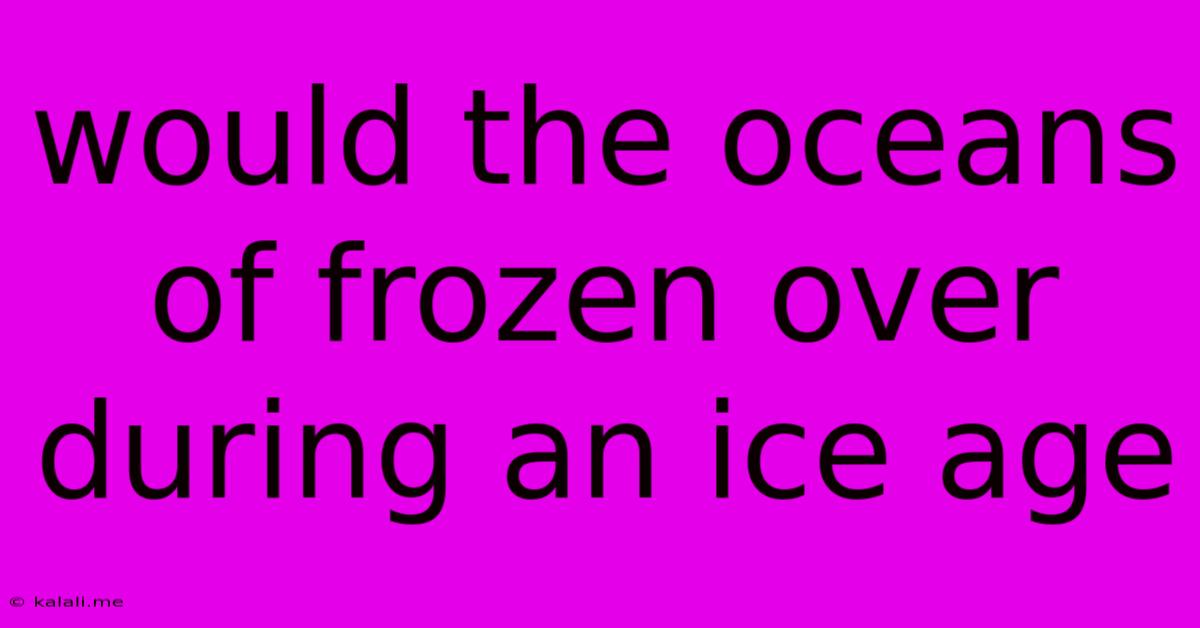Would The Oceans Of Frozen Over During An Ice Age
Kalali
Jun 07, 2025 · 3 min read

Table of Contents
Would the Oceans Freeze Over During an Ice Age? A Deep Dive into Glacial Oceanography
Meta Description: Explore the fascinating question of whether oceans freeze solid during ice ages. Discover the science behind sea ice formation, ocean currents, and the factors preventing a complete global freeze. Learn about the differences between ice ages and "Snowball Earth" scenarios.
Ice ages are periods of long-term reduction in the Earth's temperature, resulting in the expansion of continental and polar ice sheets. A common misconception is that during an ice age, the entire ocean freezes over, transforming the planet into a giant snowball. While ice ages do significantly impact global sea ice extent, a complete freeze-over of the world's oceans is highly unlikely, at least under the conditions we've experienced in recent geological history.
The Role of Ocean Currents in Preventing a Total Freeze
The global ocean circulation system, driven by temperature and salinity differences, plays a crucial role in preventing a complete freeze-over. These currents, known as thermohaline circulation, act as a massive heat transport system, distributing heat from the equator towards the poles. Warm, salty water from the tropics moves towards the poles, releasing heat to the atmosphere and eventually becoming cooler and denser. This cooler water then sinks and returns towards the equator in deeper currents. This continuous cycle prevents polar waters from becoming excessively cold and freezing solid.
Sea Ice Formation: A Different Story
While a completely frozen ocean is improbable, significant sea ice formation does occur during glacial periods. Sea ice forms when the surface temperature of the ocean drops below freezing point, leading to the formation of ice crystals that merge and accumulate. The extent of sea ice greatly increases during ice ages, particularly in the Arctic and Antarctic regions. This increased sea ice significantly impacts marine ecosystems, global albedo (reflectivity of sunlight), and global climate patterns. It's important to note the difference between sea ice (frozen seawater) and ice sheets (land-based glaciers that extend into the sea).
Factors Preventing a Global Freeze-Over
Several factors prevent a complete freezing of the oceans:
- Ocean Depth: The vast depth of the oceans acts as a significant heat reservoir. Even if the surface freezes, the deep ocean retains substantial heat, preventing a complete freeze-down.
- Hydrothermal Vents: These deep-sea vents release heat from the Earth's interior into the ocean, contributing to the overall ocean temperature and further hindering a global freeze.
- Salinity: The salt content in seawater lowers its freezing point, meaning it needs to be colder than 0°C (32°F) to freeze. This higher freezing point requirement prevents widespread freezing even in extremely cold climates.
- Atmospheric Circulation: While ice ages reduce global temperatures, atmospheric circulation patterns continue to distribute heat, albeit less efficiently than during warmer periods.
"Snowball Earth" Scenarios: A Different Beast
It's crucial to distinguish between typical ice ages and the extreme "Snowball Earth" hypotheses. These hypotheses propose that, during certain periods in Earth's history, the entire planet was covered in ice. These events are thought to have occurred under very specific and extreme conditions, drastically different from the ice ages we've experienced in recent geological history. The mechanisms leading to a Snowball Earth are still debated, but they involve factors such as significantly reduced atmospheric CO2 levels and changes in continental configuration.
Conclusion: Ice Ages vs. Complete Ocean Freeze
In summary, while ice ages lead to substantial increases in sea ice and significant cooling of the planet, a complete freeze-over of the world's oceans is highly improbable. Ocean currents, water depth, salinity, and geothermal activity all contribute to preventing a global freeze. "Snowball Earth" scenarios represent extreme and unique events, fundamentally different from the cyclical ice ages we are more familiar with. Understanding these differences is key to grasping the complexities of Earth's climate system and its response to various environmental changes.
Latest Posts
Latest Posts
-
Why Cant Led Show True Black
Jun 08, 2025
-
How To Get Other Fruit In Acnl
Jun 08, 2025
-
Proper Way To Install Spark Plugs In Honda Transit Connect
Jun 08, 2025
-
Can You Tame A Bat In Minecraft
Jun 08, 2025
-
How To Keep Dog From Digging
Jun 08, 2025
Related Post
Thank you for visiting our website which covers about Would The Oceans Of Frozen Over During An Ice Age . We hope the information provided has been useful to you. Feel free to contact us if you have any questions or need further assistance. See you next time and don't miss to bookmark.